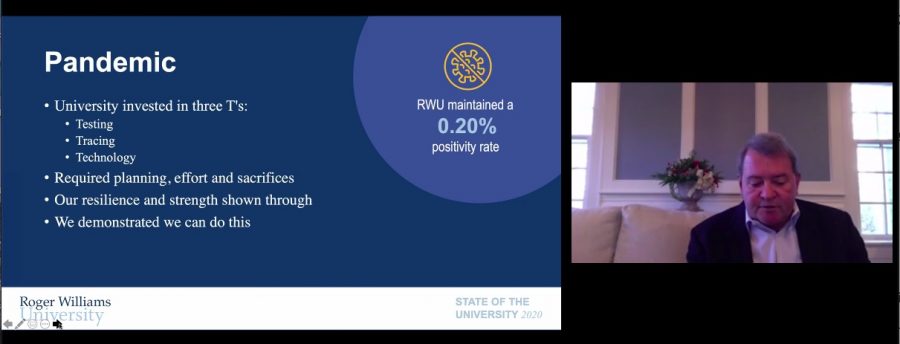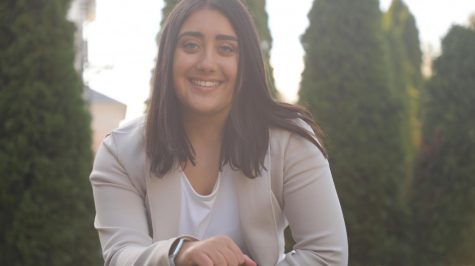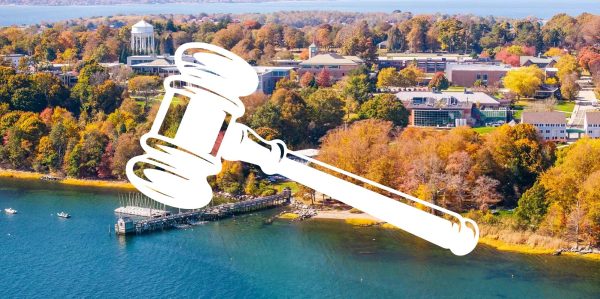COVID-19, university finances at the forefront of State of the University address
RWU President Ioannis Miaoulis discusses the university’s strategies of utilizing testing, tracing and technology to deal with COVID-19 this fall.
More than 400 viewers tuned into this year’s State of the University address, where Roger Williams University President Ioannis Miaoulis reflected on this year’s challenges and revealed information about the university’s economic status. The virtual event took place through Zoom on Dec. 4.
COVID-19 significantly impacted the university’s budget this year, with an expansive testing program, modifications to classrooms, common buildings and other changes totaling $5.9 million in expenses. This immense cost and the cumulative impact of decline in undergraduate enrollment led to an $8.4 million budget gap this year. Miaoulis said the gap is not overwhelming, adding that similar shortfalls have been faced by the university before. He acknowledged all of the sacrifices that RWU community members have made, including pay reductions and concessions for employees. Executive Vice President for Finance and Administration Jerome Williams later said these cuts contributed to around $3.3 million in savings.
“Everyone is doing their part in making some personal sacrifices, which have helped the budget immensely,” Miaoulis said.
Additional endowment draws were a primary point of concern, as the university not only utilized that tactic this year, but relied on it for the last three years to balance its operating budget. Miaoulis does not want to see this practice continue and said the board expects a plan for fiscal year 2022 that eliminates additional draws entirely.
“We’re literally robbing from our future to balance the current budget,” Miaoulis said. “It’s not a sustainable business practice.”
Despite all of the financial challenges, there were some positive economic outlooks. The university was able to raise $3.6 million this past year from all of its sources combined, which included growth in the following areas: a 32% increase in fundraising, 215% increase in trustee giving, 31 new foundation and government grants and raising more than $250,000 through a one-time reinvestment campaign from students and parents, where parents returned room and board refunds from spring 2020 back to the university.
There was also growth in enrollment management, even after undergraduate and graduate recruitment switched to virtual processes. Total graduate enrollment increased 29.5% over last year, with online graduate events seeing their largest attendance in history and first-ever international attendees. 1,203 prospective students attended fall undergraduate events.
Miaoulis discussed the university’s strategy for COVID-19 this fall in investing in the three T’s: testing, tracing and technology. Since the university began testing in partnership with the Broad Institute, 184 positive test results were identified between students, faculty and staff. RWU maintained a positivity rate of 0.20%.
He acknowledged all of the people who made a hybrid in-person experience on the Bristol campus possible: Student Life for managing the COVID-19 testing center, Athletics for taking on the brunt of test administering, Student Programs, Leadership and Orientation for virtual student programming and Academic Affairs for adapted teaching and advising. He also thanked other departments such as Health Services, the Counseling Center, Public Safety and the Instructional Design team.
“None of us had a crystal ball about the pandemic but together we made strategic decisions guided by faculty expertise, many committees and planning,” Miaoulis said. “We delivered an amazing experience for our students.”
Looking ahead, Miaoulis said the main priority for 2021 is focusing on people. Major search efforts will be underway into the new year, including the search for a new chief diversity officer and new SECCM dean, following the loss of the late former SECCM Dean Robert Potter this year. Inclusive leadership training will kick off for cabinet members and there will be wider offerings of bias training across campus, which students advocated for this fall.
In terms of strategic planning, the university is looking at 6 and 18 month cycles. The six month process will prioritize this fiscal year and the 18 month process will bring the university through FY 2022. Miaoulis emphasized the importance of attracting new students and focusing efforts on unification and collaboration with other university divisions, including the University College and School of Law.
Miaoulis said it is critical that the university achieve a balanced budget and that the budget must be better addressed going forward. On the upside, he said winter 2020 registration is showing promise, with the most recent registration reports showing a 161% increase from last year, with 766 students registered for undergraduate winter classes as opposed to 293 who registered by Dec. 1 of last year. He added that focus on enrollment must be applied to the summers of 2021 and 2022 as well.
Though winter session enrollment will help the budget greatly, Miaoulis acknowledged that much of the spring is still uncertain and out of the university’s control. He said working groups are starting to work on new recruitment and retention ideas and revenue diversification, and added they will be seeking faculty input on these plans soon. As his second State of the University address closed, he emphasized that unity and collaboration are necessary factors for future success.
“I said in my job interview here that I believe Roger Williams University had all the right ingredients of a modern university. I believe that even more today, but since I love cooking, allow me to expand the analogy. We all have the right ingredients, but we need to share them and agree on the meal we are preparing,” Miaoulis said. “My challenge to all of us is to use this pause to recharge and ride this wave of momentum into a great future together.”







